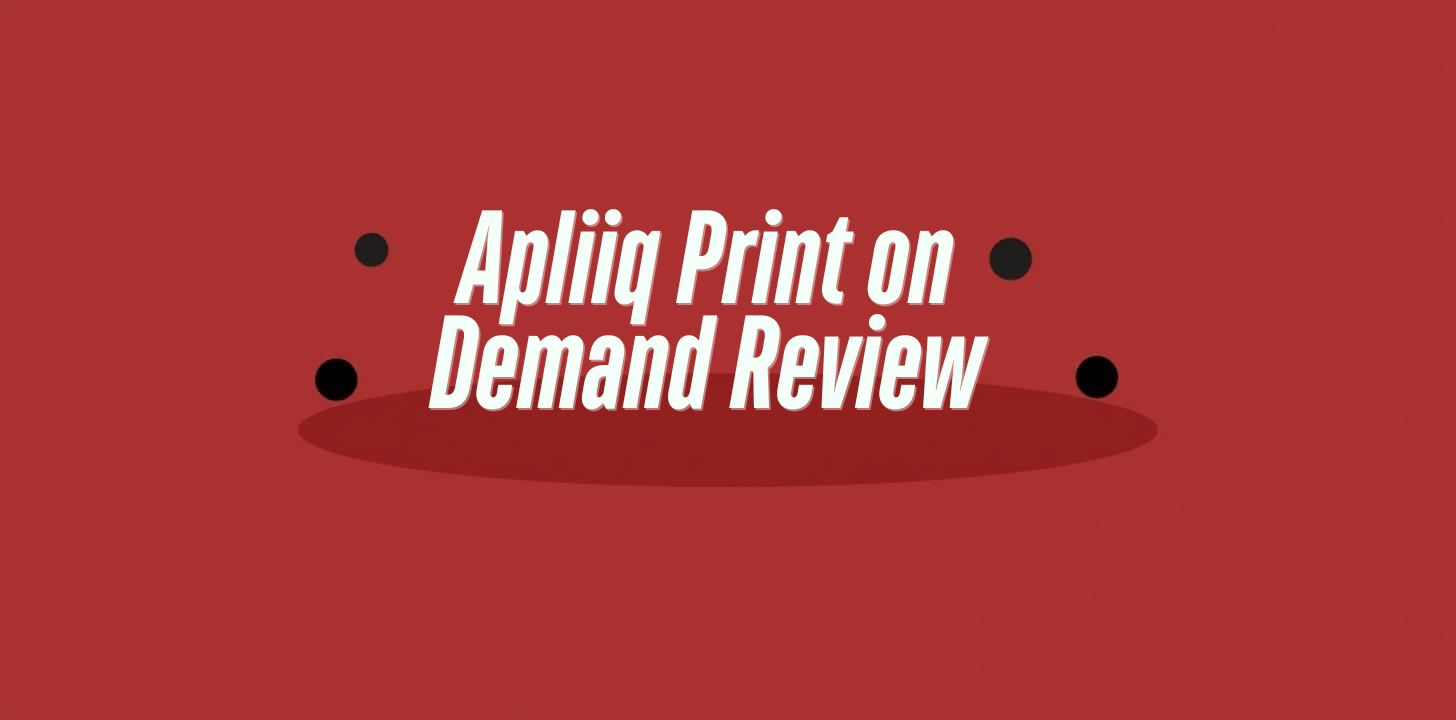Apliiq print on demand costs about 40% more than other POD companies like Printful. But fashion entrepreneurs keep choosing Apliiq dropshipping services anyway. Here's why—and whether you should too.
What Is Print-on-Demand?
📖 Quick Definitions:
• Print-on-demand (POD): Products are only made after customers order them
• Dropshipping: The POD company ships directly to your customers (you never handle inventory)
• Blank: The base garment (t-shirt, hoodie, etc.) before your design gets printed on it
How it works: Customer buys from your online store → Order goes to POD company → They print your design and ship to customer → You keep the profit.
🤔 Is Apliiq Right for You? (Quick Check)
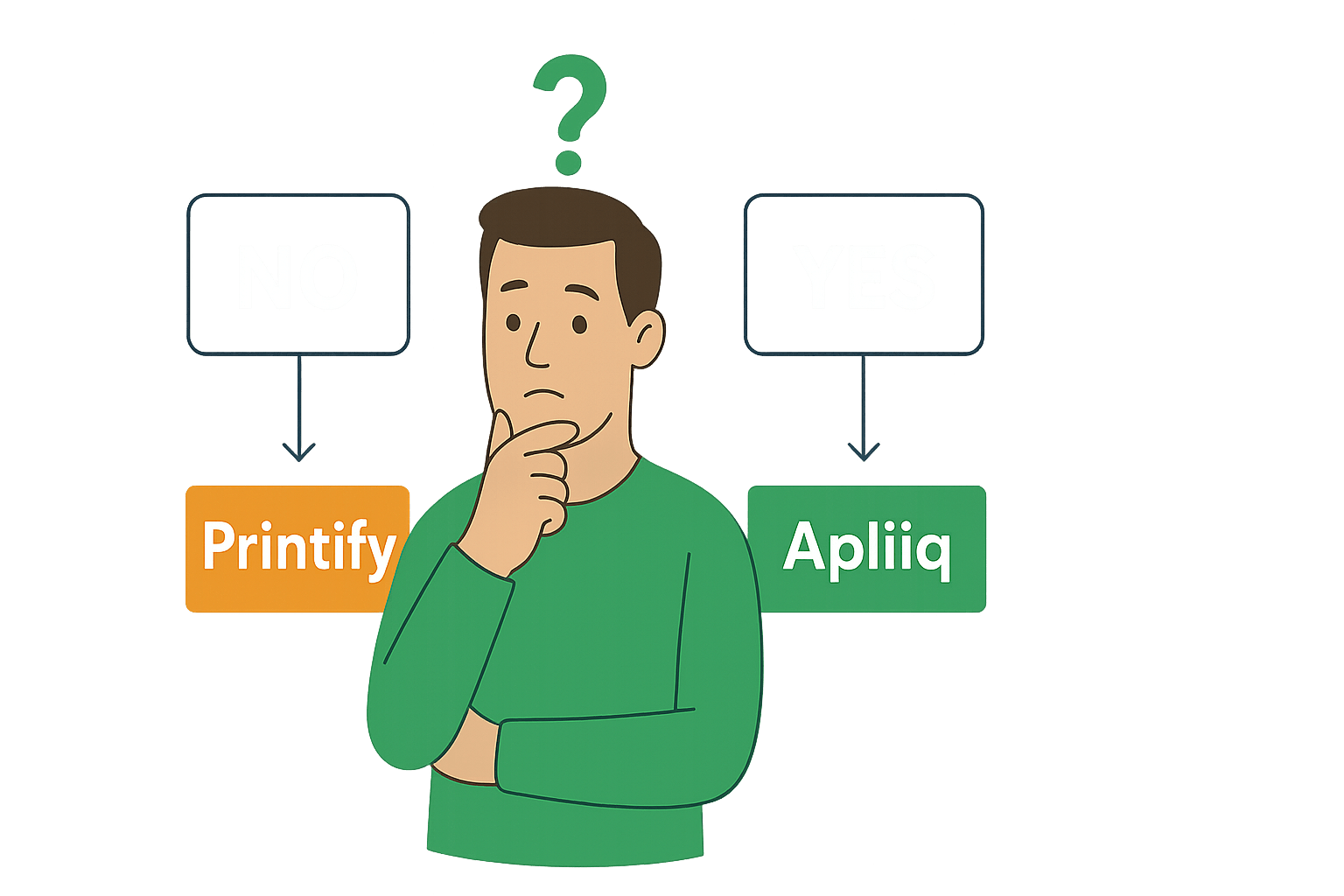
Are you just testing POD for the first time?
→ YES: Start with Printify (cheaper, simpler)
Do your customers care about brand quality?
→ NO: Use Printful (good middle ground)
Are you building a fashion/streetwear brand?
→ YES: Apliiq reviews consistently show it's worth considering
Can you afford 40% higher costs for better quality?
→ YES: Apliiq could be a good fit
→ NO: Consider companies like Apliiq but with lower pricing (Printful, Printify)
What Makes Apliiq Different from Other POD Companies
Most print-on-demand companies follow the same playbook: offer the cheapest possible blanks (usually Gildan basics), focus on volume, and let sellers compete purely on price. The result? Thousands of stores selling essentially identical products with different graphics slapped on them.
When Ethan Lipsitz founded Apliiq in 2009 after customizing his own hoodie at University of Pennsylvania, he saw this problem firsthand. Instead of just creating another commodity POD service, he built infrastructure specifically for people who wanted to create actual fashion brands—not just sell generic merchandise with different designs.
Sixteen years later, that original insight still drives everything Apliiq does. They've deliberately chosen to serve a smaller, more demanding market rather than chase volume with race-to-bottom pricing. Their client roster includes A-list hip hop artists, professional athletes, and major tech companies—customers who need retail-quality products that won't embarrass their brands.
This focus shows up in their product choices, where other companies might offer 15 different $3 t-shirts, Apliiq curates premium blanks from brands like Bella + Canvas that feel retail-ready. It shows up in their services, where others provide basic printing and call it a day, Apliiq invested in custom woven label capabilities, professional design review, and white-label packaging.
The trade-off is obvious: higher costs. But for entrepreneurs building premium brands, those extra features often justify the investment because they enable higher selling prices and better customer perception.
Unique Apliiq Print on Demand Features You Can't Get Elsewhere
Custom branding that builds real brand equity:
Woven labels might seem like a small detail, but they completely change how customers perceive your products. Instead of receiving a generic t-shirt with a design on it, they get something that feels like it came from a real clothing brand. That psychological shift is worth a lot in customer loyalty and willingness to pay premium prices.
Beyond labels, Apliiq offers custom patches, Apliiq embroidery services, and completely white-label packaging. When your customer opens their order, they see only your brand—never Apliiq's. This level of brand control simply doesn't exist with major competitors like Printful or Printify.
Premium Apliiq products and quality control:
Apliiq refuses to work with cheap blank suppliers. Their catalog of 750+ Apliiq clothing products comes exclusively from premium manufacturers known for superior fit, feel, and durability. Every design also goes through professional artist review before production, which prevents the quality issues that can kill brand reputation.
Faster fulfillment from strategic locations:
With production facilities in Apliiq Los Angeles and Apliiq Philadelphia locations, Apliiq can serve most of the US market with 2-3 day Apliiq shipping time. Orders are automatically routed to the closest facility, which means better delivery times and lower shipping costs for your customers.
What It Actually Costs (Real Apliiq Pricing Numbers)
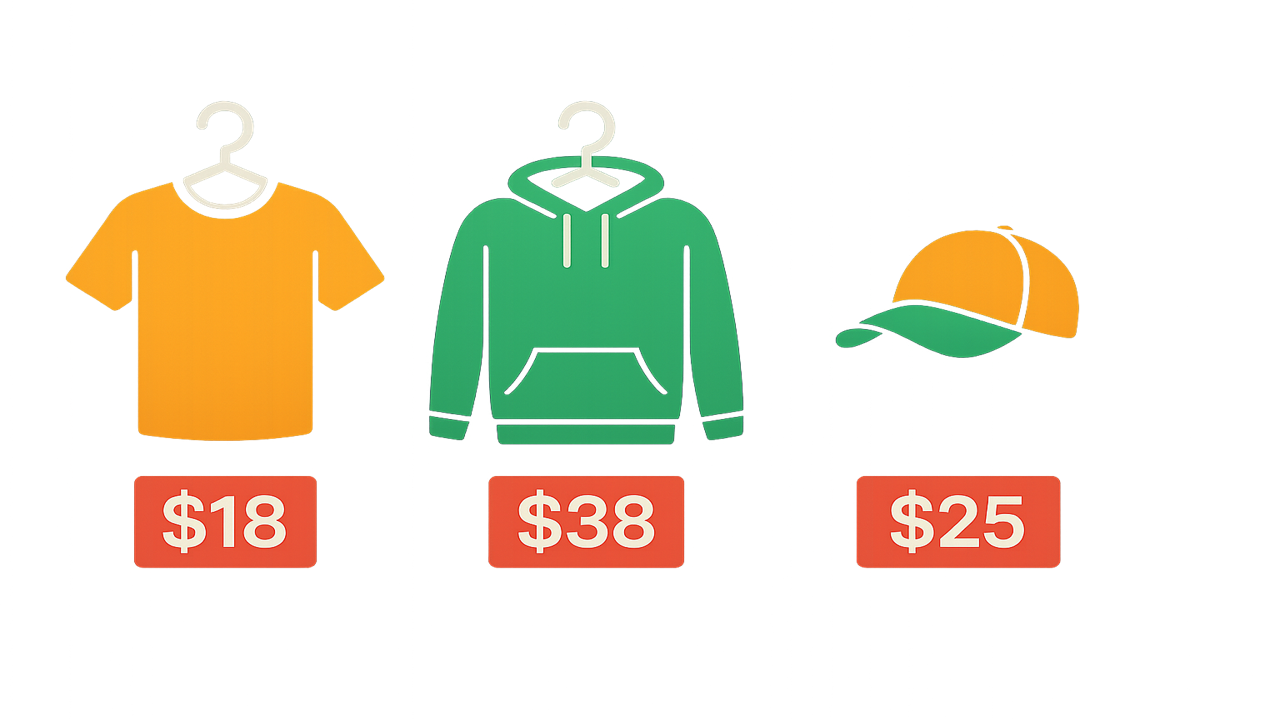
Understanding Apliiq's pricing requires looking at the complete picture, not just base garment costs. Yes, their blanks cost more upfront, but the premium positioning often enables higher profit margins.
💰 Complete Cost Breakdown:
Base garment prices:
- T-shirts: $7-18 (comparable retail: $25-45)
- Apliiq hoodie options: $15-45 (comparable retail: $60-120)
- Apliiq hats: $8-25 (comparable retail: $30-60)
Printing and customization:
- Basic printing: $6-8
- Embroidery: $6-12
- Custom woven labels: $1.50-3 each
Real example: Premium Apliiq hoodie business
Let's say you're building a streetwear brand targeting customers who currently buy from established fashion labels. A premium Apliiq hoodie might cost you $38 total (base + printing + shipping), which you could realistically sell for $75-85 based on the quality and branding.
Compare that to a budget POD approach: $15 total cost, but customers only willing to pay $35-40 because the quality clearly screams "dropshipping." Your profit margin is actually better with Apliiq despite the higher upfront costs.
Ways to Optimize Costs
VIP Membership at $30/month provides 20% off all orders and makes sense once you're doing $200+ monthly in volume. The break-even point is around $150/month, but the real value comes from priority support and early access to new products.
Volume discounts scale significantly: 10% off for 10-24 items, 15% for 25-49 items, and up to 55% off for bulk orders over 100 pieces. This makes seasonal launches and inventory buys much more affordable. Look for Apliiq promo codes and Apliiq coupons during major sales events for additional Apliiq discount opportunities.
Apliiq vs Printful and Other POD Companies
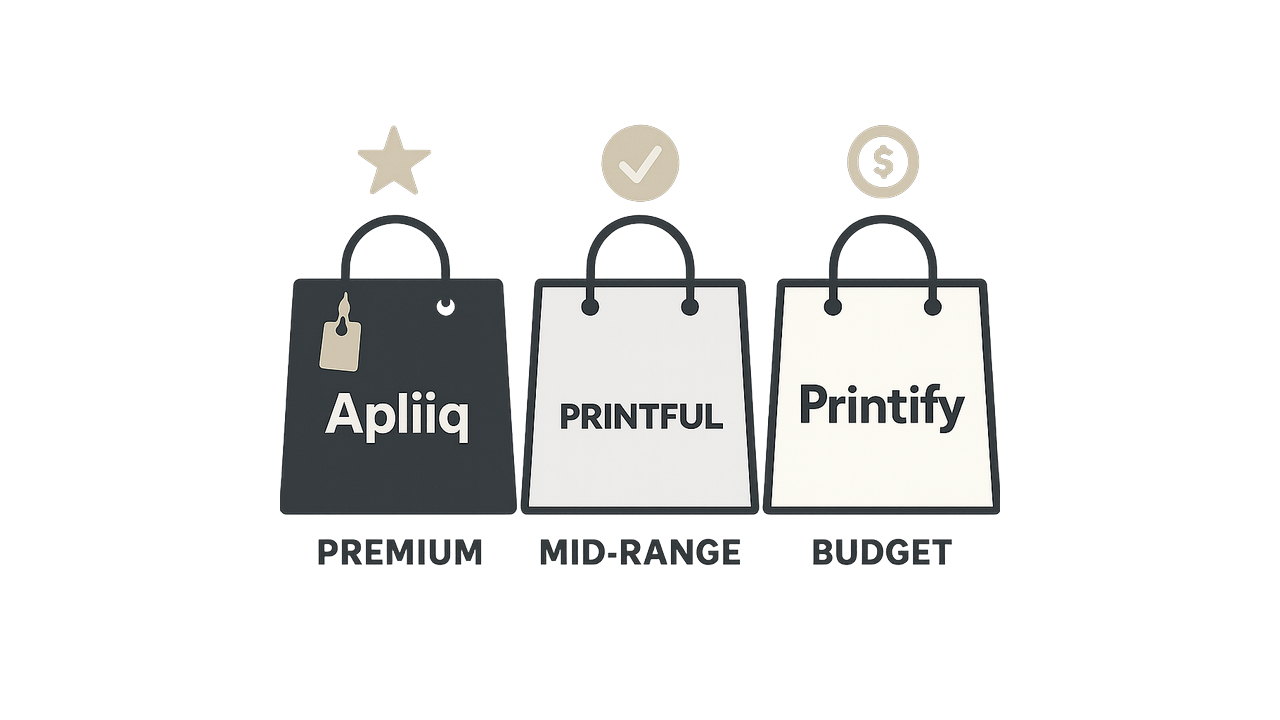
| Feature | Apliiq | Printful | Printify |
|---|---|---|---|
| Best for | Fashion brands | General POD | Beginners |
| Price level | Premium | Mid-range | Budget |
| T-shirt quality | High-end only | Mix of cheap/premium | Mostly budget |
| Custom branding | Woven labels, patches | Limited options | Basic only |
| Shipping speed | 2-5 days | 3-7 days | 4-10 days |
| Platform support | Mainly Shopify | 20+ platforms | 15+ platforms |
| Setup difficulty | Easy | Medium | Easy |
The comparison isn't really about which platform is "better"—it's about which one matches your business model and customer expectations.
Printful serves the broad middle market well. They offer decent quality at reasonable prices with extensive platform integrations. If you're selling to general audiences who want good value, Printful is probably the sweet spot.
Printify focuses on maximum variety and minimum costs. They're perfect for testing ideas, serving price-sensitive customers, or running high-volume, low-margin businesses.
Apliiq is specifically designed for premium positioning. For those wondering "is Apliiq legit," their 16-year track record and client roster of major brands speaks to their credibility. If your customers are willing to pay $60+ for hoodies and care about brand authenticity, the extra features justify the higher costs.
Important Details You Should Know
Getting started is surprisingly straightforward despite the premium positioning. Account creation is instant and free, with no credit checks or minimum commitments. The Apliiq Shopify integration takes about 10 minutes to set up through the Apliiq Shopify app and handles everything automatically from product sync to order fulfillment.
Customer service operates at a different level than typical POD companies. You get actual phone support at 213-253-2727 during business hours (8 AM-5 PM PST), plus email at cs@apliiq.com. Response times are usually measured in hours, not days, and the support team often provides business strategy advice beyond basic order questions.
Production timelines are faster than you'd expect for custom work. Standard items ship within 2-5 business days, while custom branding like woven labels adds 5-7 days. Rush processing is available for a 10% surcharge if you need faster turnaround.
Quality control is built into every step. Less than 2% of orders have quality issues (compared to 5-8% industry average), and problems are handled with full refunds or reprints. The artist review process catches most issues before production, which saves everyone time and frustration.
File requirements are flexible: at least 300 DPI resolution, standard formats like PNG/JPG/PDF, RGB color mode, and up to 20MB file sizes. Vector files work best for embroidery, but they'll work with whatever you provide.
The Bottom Line: Should You Use Apliiq?
The decision ultimately comes down to your business model and customer expectations. Apliiq dropshipping reviews consistently highlight their excellence at helping people build premium fashion brands, but that focus makes it overkill for many POD applications.
Choose Apliiq when you're:
- Building a brand where quality and authenticity matter more than low costs
- Targeting customers who already pay $50+ for clothing from established brands
- Planning to scale beyond casual side-hustle into serious business
- Using Shopify as your primary platform (where integration is seamless)
Choose alternatives when you're:
- Just testing POD concepts with minimal investment
- Competing primarily on price in commodity markets
- Focusing on international sales (where shipping becomes expensive)
- Need integrations with multiple platforms beyond Shopify (consider brands like Apliiq such as Printful for broader platform support)
The quality difference is real and noticeable. If you order samples from both Apliiq and budget competitors, you'll immediately understand why fashion entrepreneurs pay the premium. The question is whether your customers will value that difference enough to justify the higher prices you'll need to charge.
For serious fashion brands, the answer is usually yes. For casual sellers testing designs, probably not.
